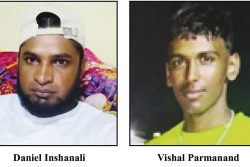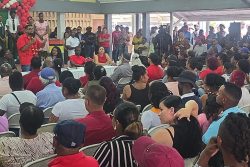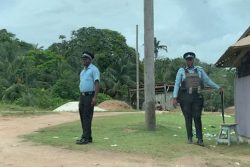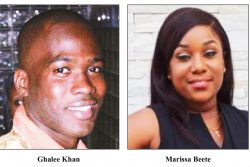Like so many Guyanese who have migrated to North America, I have a special place in my heart for Canada as the place where I matured as a person and developed as a song-writer and a band-leader. I spent 25 years in Canada, and while I saw much of the country I developed a love, in particular, for Ontario where I lived all the time I was there. I have often said that my  development as an artiste is owed largely to those years outside Guyana, because although as The Tradewinds began I was focusing as a writer specifically on the Caribbean, the execution of what I was about rested on the ambience and opportunities of Toronto. One salient example was a small downtown entertainment place called the Mercury Club in which I had my first experience as an unknown immigrant with a guitar. I entered the Amateurs Night at the club, singing the ballad ‘You’ll Never Walk Alone’, nervous to my core, but gaining second place among the nine other performers. It’s almost eerie that following the formation of the Tradewinds in 1966 I ended up buying the Mercury Club in 1970. I renamed it We Place, and it was a home-away-from-home for Caribbean people for almost 10 years until I moved the band to Grand Cayman. We Place gave us a permanent base between tours, and was essentially the hinge on which much of The Tradewinds’ later success swung. The point here is that with the state of the music industry in Guyana, it would have been impossible for me, as a musician starting out, to even dream of a development like that in my homeland.
development as an artiste is owed largely to those years outside Guyana, because although as The Tradewinds began I was focusing as a writer specifically on the Caribbean, the execution of what I was about rested on the ambience and opportunities of Toronto. One salient example was a small downtown entertainment place called the Mercury Club in which I had my first experience as an unknown immigrant with a guitar. I entered the Amateurs Night at the club, singing the ballad ‘You’ll Never Walk Alone’, nervous to my core, but gaining second place among the nine other performers. It’s almost eerie that following the formation of the Tradewinds in 1966 I ended up buying the Mercury Club in 1970. I renamed it We Place, and it was a home-away-from-home for Caribbean people for almost 10 years until I moved the band to Grand Cayman. We Place gave us a permanent base between tours, and was essentially the hinge on which much of The Tradewinds’ later success swung. The point here is that with the state of the music industry in Guyana, it would have been impossible for me, as a musician starting out, to even dream of a development like that in my homeland.
In effect, Toronto, with its organised music industry and recording opportunities, and with a ready-made audience for my music among the huge Caribbean immigrant population, made the Tradewinds story possible. Playing six nights in a week in We Place, we branched out on weekends to perform in cities across North America, and across the Caribbean on tours twice a year. Unlike many starting groups, bouncing from pillar to post, Tradewinds was anchored by that little club in Toronto – we had a home. We were spared the scrunting that emerging musical groups so frequently must endure.
Along the way, while enjoying the musical success, we were inevitably developing an affection for this new country, and to this day, 50 years later, even following our move to Grand Cayman in 1980, Canada remains a special place to the four West Indians – Clive Rosteing, Jeff Japal, Harry Cupid, and myself – who matured and developed in a way that would have been very unlikely for our profession if we had remained at home. I grew to love Canada, married a Canadian, Dorothy, fathered two wonderful children – Luana and Tony – and to this day I remain grateful to the country for what, like so many immigrants, it handed me. On a lighter note, apart perhaps from mangoes, there is no fruit for me like Canadian Bing cherries (coming into crop right now) and nothing quite like the roadside corn-on-the cob that is abundant all over Ontario. (On one trip back to visit in recent years with my family, I sat down to dinner one day and ate 10 ears of corn all by myself.)
In that 10-year We Place spell I also made scores of friends from all across the Caribbean, and though I wasn’t consciously aware of it then I realised later that I was embedding my Caribbean roots while living thousands of miles outside. I was spending considerable time devouring all those old Caribbean recordings on the Cook label, and reading for the first time of some searing episodes of Caribbean history and learning about icons such as Rex Nettleford, the Mighty Spoiler, CLR James, Martin Carter, Vidia Naipaul, George Lamming, Louise Bennett – it’s too long a list to reproduce here. I was finding material to fan my enthusiasm. In that period, as well, I was surrounded by the large Martins family aggregation, some 40 or so strong, many of whom had migrated to Toronto after I and my sister Cecelia; they were anchors for me, too, and part of my growth process, and remain so.
Some 30 years after I moved with the band to Grand Cayman to live, Canada is big in my past. Very early in my time there I was drawn to the order, and the efficient systems and discipline of Canadian life, and the general ‘good sense’ of the people. Not to say that I’m fond of the winter spells (I remember changing a flat tyre on a shoulder of the 401 highway, the day after a snowstorm, with the melting snow drenching me from cars flying by. I was so cold and wet I would slip inside the car every few minutes and turn on the heater to fight the freeze) but I enjoy the summer trips back; I know the city like an old friend; I’m aware again of the order and the standard, and things that run on time.
On the trips back, I enjoy the familiar surroundings and the long-cherished friends, and when I do musical performances in ‘Trawna’ (as the Torontonians enunciate it) it’s an old familiar embrace. Next month, Sunday 21 August I’m into one of those in a show at the Tropical Nights Lounge in Scarborough backed this time, not by Tradewinds, but by Guyanese Raymond ‘Chinny’ Lee-Own, who used to be one of the We Place regulars in the ʼ70s and is now leader of the Triple Play band, as a full-time musician in Toronto. (If you care to come, call Chinny at 905 477-9183 for details.) Be assured that in between the Sunday gig, I will be into the Bing cherries and the sweet corn and the family gatherings, and a city where all the traffic lights work. But don’t let’s get completely carried away here; my affection for Trawna is not affected by blindness, so you won’t get me there in December; that flat tyre in the winter slush is still fresh in my mind.








